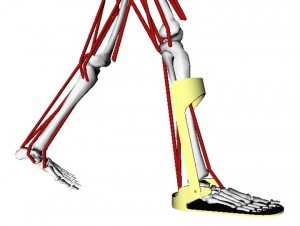 Orthoses are commonly prescribed for individuals with cerebral palsy, stroke, spinal cord injury, and many other disorders to help improve movement and quality of life. However, fabricating and fitting the optimal orthoses for each individual remains challenging. Due to limitations in comfort, aesthetics, and function, many individuals abandon use of their orthoses.
Orthoses are commonly prescribed for individuals with cerebral palsy, stroke, spinal cord injury, and many other disorders to help improve movement and quality of life. However, fabricating and fitting the optimal orthoses for each individual remains challenging. Due to limitations in comfort, aesthetics, and function, many individuals abandon use of their orthoses.
In collaboration with UW’s Division of Prosthetics & Orthotics we are using novel rapid prototyping techniques, ultrasound imaging, and musculoskeletal simulation to design new orthoses and evaluate the underlying mechanisms by which orthoses can improve movement. By evaluating changes in muscle dynamics and function with different types of orthoses we aim to optimize the design of orthoses to individuals’ movement patterns. These analyses will enable clinicians to understand the impact of orthoses and lead to the creation of novel designs.
Funding
This material is based upon work supported by the National Science Foundation under Grant Number CBET 1452646. Any opinions, findings, and conclusions or recommendations expressed in this material are those of the author(s) and do not necessarily reflect the views of the National Science Foundation.
Recent News
Congratulations to Dr. Nicole Zaino on earning her Doctorate in Mechanical Engineering! Dr. Zaino’s PhD thesis dissertation was titled Walking ...
Zahra was selected from a highly competitive application pool to receive the Mary Gates Research Scholarship. The scholarship allows students ...
Congratulations to Nicole Zaino for passing her General Exam! Nicole's proposed work titled Neuromechanics of multimodal mobility for individuals with cerebral ...
Congratulations to Megan Ebers for passing her general exam! Megan's proposed work titled Data-driven methods for improving physics-based models of ...
Congratulations to Michael Rosenberg for being awarded the Komor New Investigator Award at the 2021 Technical Group on Computer Simulation ...
How can we decipher human movement? Our skeletal muscles have amazing structure. They provide elegant and efficient actuation to move ...
Congratulations to Michael Rosenberg for being awarded the Gatzert Child Welfare Fellowship. This fellowship is a one-quarter fellowship awarded for ...
Journal Article in Prosthetics & Orthotics International Background Assessments of human movement are clinically important. However, accurate measurements are often ...
Congratulations to Michael Rosenberg for passing his general exam! Michael's proposed work titled Modeling and Predicting Subject-Specific Responses to Ankle Exoskeletons ...
We partnered with NBC Learn to share some of our work on exoskeletons to help encourage students to consider a ...
Funding
- NSF CAREER Award: The Ultimate Machine – Modeling neuromuscular control and musculoskeletal dynamic to improve human ability
 Orthoses are commonly prescribed for individuals with cerebral palsy, stroke, spinal cord injury, and many other disorders to help improve movement and quality of life. However, fabricating and fitting the optimal orthoses for each individual remains challenging. Due to limitations in comfort, aesthetics, and function, many individuals abandon use of their orthoses.
Orthoses are commonly prescribed for individuals with cerebral palsy, stroke, spinal cord injury, and many other disorders to help improve movement and quality of life. However, fabricating and fitting the optimal orthoses for each individual remains challenging. Due to limitations in comfort, aesthetics, and function, many individuals abandon use of their orthoses.